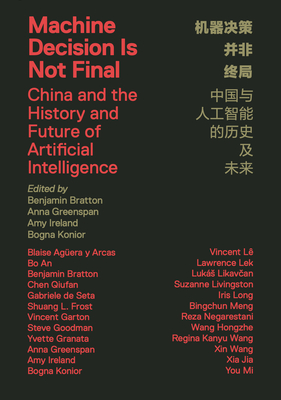相關主題
商品描述
This textbook opens with a simple question: what does it mean for a machine to think? Bridging philosophy, cognitive science, cybernetics, and machine learning, it connects contemporary advancements in artificial intelligence with foundational debates about mind, perception, and truth. By examining the capabilities and limitations of AI systems - including the phenomenon of AI hallucinations - it interrogates whether machines can truly 'understand' or if their intelligence is ultimately an illusion. This interdisciplinary textbook offers a timely exploration of the evolving relationship between humans and intelligent systems, shedding light on how AI challenges and reframes our understanding of cognition, knowledge, and the nature of intelligence itself and contains helpful key concept lists and summaries making it of great use to graduate students and professionals.
商品描述(中文翻譯)
這本教科書以一個簡單的問題開始:機器思考意味著什麼?它橋接了哲學、認知科學、控制論和機器學習,將當代人工智慧的進展與關於心智、知覺和真理的基礎辯論聯繫起來。通過檢視人工智慧系統的能力和限制,包括人工智慧幻覺的現象,它質疑機器是否真的能「理解」,或者它們的智慧是否最終只是一種幻覺。這本跨學科的教科書及時探討了人類與智能系統之間不斷演變的關係,闡明了人工智慧如何挑戰並重塑我們對認知、知識和智慧本質的理解,並包含有用的關鍵概念列表和摘要,對研究生和專業人士非常有幫助。
作者簡介
Kristina Sekrst acquired a Ph. D. in Logic at the University of Zagreb, along with master's degrees in Cognitive Linguistics, Philosophy, Comparative Linguistics, and Croatian Language. She teaches philosophical and linguistic courses at the University of Zagreb, and, in parallel, consults as a principal software engineer in the field of artificial intelligence, machine learning and AI ethics, combining academic with industrial expertise. Her industrial work includes providing consultancy for large language models for companies dealing with AI alignment, being a part of the team that discovered AI prompt injections, an issue that shaped the development of large language models. She is a co-author of one linguistics textbook, and an author of over 50 papers and talks in the field of artificial intelligence, philosophy of science and linguistics.
作者簡介(中文翻譯)
Kristina Sekrst 在札格雷布大學獲得邏輯學博士學位,並擁有認知語言學、哲學、比較語言學和克羅埃西亞語的碩士學位。她在札格雷布大學教授哲學和語言學課程,同時擔任人工智慧、機器學習和人工智慧倫理領域的首席軟體工程師,將學術與產業專業知識結合。她的產業工作包括為處理人工智慧對齊的公司提供大型語言模型的諮詢,並參與發現人工智慧提示注入的團隊,這一問題影響了大型語言模型的發展。她是一本語言學教科書的共同作者,並在人工智慧、科學哲學和語言學領域發表了超過50篇論文和演講。































